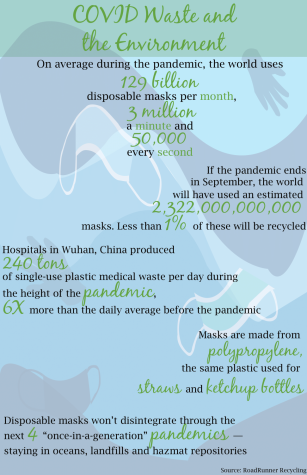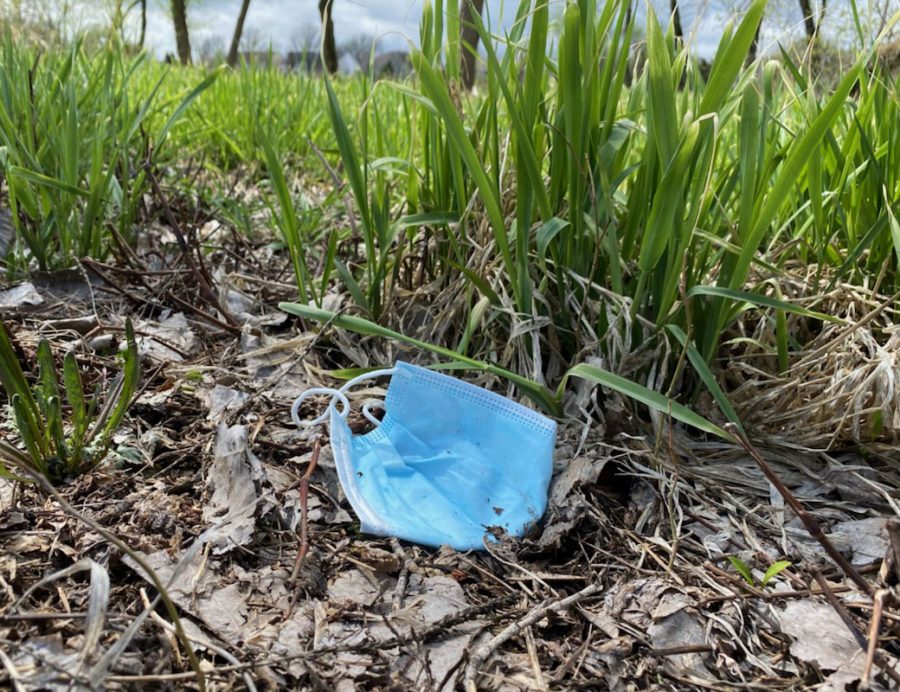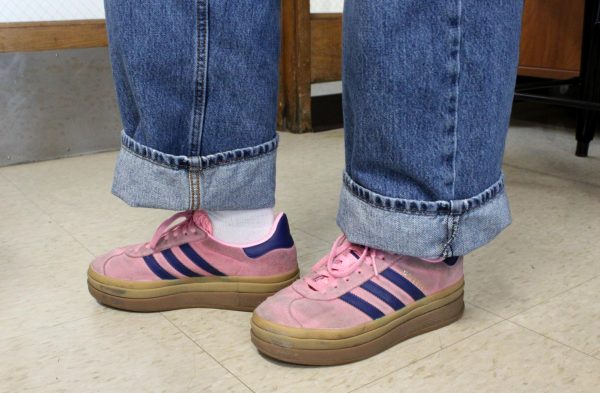Covid Waste is Littering Libertyville and our Planet

Masks have become a part of the normal routine for people all over the world and are essential for protecting the population from Covid-19, according to the Centers for Disease Control and Prevention. In fact, about 93% of adults leave their home with a mask, according to a National Geographic and Morning Consult pool. And in most areas, they are required.
In addition to single-use disposable gloves and hand sanitizer bottles, masks have created a new category of waste detrimental to our planet and environment.
“Covid Waste” is a term created to categorize the huge influx in waste due to the Covid-19 pandemic, and this type of waste can be seen throughout various public places. Masks are often scattered on the ground, blowing in the wind, with their loops sometimes caught around brush and shrubs. Those masks, if not picked up or blown away, could stay in the same spot for 450 years. In addition, according to Waste Free Oceans, disposable masks could cause problems much further down the line, like affecting wildlife, especially birds.
With the enormous demand for masks, huge amounts of waste will likely follow. Many environmental agencies have estimated that around 100-150 billion masks are now disposed of each month around the world, with the majority of those masks being disposed of improperly or ending up in the ocean. With these numbers, there could soon be more masks than jellyfish in the ocean, according to The Guardian.
Since there have not been many formal, long-term studies on the subject due to the recency of the topic, there is no data confirming the precise amount of masks being used; however, if someone looks around in public, they would most likely see a mask littered somewhere on the ground. A short walk earlier this month on the North Shore Bike Path found seven masks, one pair of gloves and one hand sanitizer bottle littered on the group. And when driving around Libertyville, masks can be seen caught on the side of large roadways in brush and blowing in the streets.
The physical qualities of disposable masks have specifically made them more damaging to the environment. The lightweight nature of masks make them easier to travel and be accidentally littered. The ear loops make it easy for the masks to attach to objects, including animals. According to covidlitter.com, a website created by researchers for tracking Covid waste incidents in animals, there have been 45 instances in which humans have spotted animals affected by Covid waste. Instances have included masks being ingested by wildlife, masks being used as nesting material, and mask loops being stuck around a bird’s legs, making the bird unable to fly. While this number is low, it encompasses only recently reported incidents; the actual number of affected animals is likely higher. Citizens wishing to report incidents to be used in research can submit their pictures at covidlitter.com.
The best way to prevent having a disposable mask or gloves from harming the environment is to simply avoid using disposable masks and gloves, according to GreenMatters. The World Health Organization recommends using a cloth face covering when going out in public instead of using a disposable mask. Cloth masks are the best alternative to disposable masks because they can be reused and washed after every use.
The best alternative to using disposable gloves is to simply wash your hands more often. The World Health Organization and the CDC, along with many physicians, have decided that disposable gloves are unnecessary as the risk for surface transmission of Covid-19 is very low; gloves give the wearer a false sense of security, leading them to possibly touch contaminated surfaces. The CDC recently came out with research saying you have a 1 in 10,000 chance of catching Covid-19 on a contaminated surface.
If someone wears a disposable mask, many environmentalists have urged people to “snip the straps” of the mask before disposing of it to avoid issues like the mask being entangled in wildlife.
Many people and researchers have found creative ways to address the issue, as the Royal Melbourne Institute of Technology in Australia has found a way to recycle disposable masks and turn them into roadways. According to their findings, 2.5 million recycled masks could be used to produce one mile of roadways, saving 102 tons of waste.
Hospitals, such as Advocate Condell Medical Center in Libertyville, have developed strategies on how to combat Covid waste and how N95 respirators — highly effective masks that are vital to hospitals and health care workers — could be conserved.
“Alongside our efforts to provide our team members with the equipment they need to effectively and safely care for our patients, we instituted efforts to conserve critical PPE supplies and invested in domestic PPE production, which secures the supply chain and reduces carbon emissions associated with sourcing PPE from suppliers overseas,” said hospital spokeswoman Kirsten Johnson. “Our solid and medical waste continues to stay significantly below the national average for hospitals. At Advocate Condell Medical Center, we saw an insignificant change in waste last year when compared to 2019.”
Advocate Condell is also committed to continuing their environmental efforts in the future.
“We’ve committed to transitioning to 100% renewable electricity by 2030, a change that will reduce carbon dioxide emissions by nearly 400,000 metric tons,” said Johnson, who added that the hospital received an award last year for its sustainability practices.







![Senior River Thompson joins the Jazz Ensemble by singing “That Old Black Magic” by Mercer and Arlen Arr. Mark Taylor, along with senior Annie Brody on guitar and junior Thomas Teixeira on bass, earning big applause. “[The concert had] great energy because it's the last [jazz concert] of the year,” Brody said.](https://www.lhsdoi.com/wp-content/uploads/2025/04/Eight-That-Old-Black-Magic-600x400.jpg)
![Mr. Abullh Ali, manager/assistant, helps open Queen Yemeni Coffee in downtown Libertyville at 606 North Milwaukee Ave. With the help of employees such as manager and LHS senior Yousef Taha, they are able to bring the Yemeni and Ethiopian culture to Libertyville by using their Queen spices, cinnamon and cardamom in their drinks such as Adani Chai, which is inspired by Sheda, the Queen of Yemen and Ethiopia. “The history of our coffee [is] a long history and we believe that Yemen and Ethiopia started the coffee and we are bringing something unique to the community,” Mr. Ali said.](https://www.lhsdoi.com/wp-content/uploads/2025/04/Photo-1-600x400.jpg)


